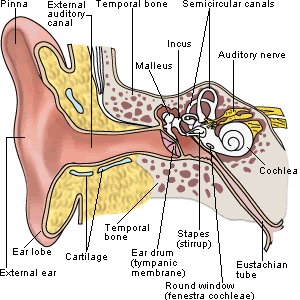Hearing Loss
 Hearing loss occurs when there is a problem somewhere along the auditory pathway. Depending on the cause, it may be mild or severe, temporary or permanent.
Hearing loss occurs when there is a problem somewhere along the auditory pathway. Depending on the cause, it may be mild or severe, temporary or permanent.
Ears pick up sound waves and translate this information into a form the brain can understand. The remarkable thing about this process, is that it is by and large purely mechanical, compared to the other senses (smell, vision and taste) in which there are chemical reactions involved.
In normal hearing, sound waves travel through the ear canal to cause vibration of the eardrum (known as the tympanic membrane). Vibration of the tympanic membrane causes the ear ossicles (3 small bones in the middle ear) to vibrate, which in turn stimulate the sensory hair cells in the cochlea which then send impulses to the auditory nerve and on to the brain. Any disruption to this process can potentially cause loss of hearing.
Causes of Hearing Loss
Doctors generally classify hearing loss into 2 main forms:
1. Conductive Hearing Loss - in which the transmission of sound waves from the external environment to the cochlear is disrupted. Anything which blocks or disrupts this normal conduction can potentially cause hearing loss of the "conductive" type.
• Obstruction of the external ear canal eg. by impacted ear wax, foreign body, severe otitis externa in which the ear canal is swollen and filled with discharge.
• Perforation of the eardrum
• Otitis media - in which the middle ear is filled with fluid or pus.
• Damage to the ear ossicles
2. Sensorineural Hearing Loss - in which there is damage to the cochlea or the auditory nerve.
• Ageing (presbycusis) - Changes in the inner ear that happen with age, cause a slow but steady loss of hearing. This loss may be mild or severe, but it is always permanent.
• Noise - Noise-induced hearing loss can happen slowly over time. Being exposed to everyday noises, such as listening to very loud music or exposure to loud industrial noises, can damage the structures of the inner ear, leading to hearing loss over many years. Sudden loud noises, such as an explosion, can also cause acute hearing loss.
• Ménière disease - a disease than causes progressive hearing loss, tinnitus and giddiness.
• Acoustic neuroma - a tumour of the vestibular nerve.
• Drugs which can cause damage to the nerves or sensory hairs involved in hearing.
Symptoms of Hearing Loss
Depending on the cause, hearing loss may be sudden or gradual, and can affect one or both ears. There may be a muffled feeling in the ears, or the sensation of having ones ears plugged up. There may be difficulty understanding what people are saying, especially when other people are talking or when there is some background noise eg. from traffic. Friends and family may complain that the affected person does not respond when called, or complain about having to speak much louder when conversing with the person.
Other associated symptoms may include tinnitus (ringing in the ears), vertigo (spinning sensation), pain, itch or discharge from the ear.
Diagnosis of Hearing Loss
ENT surgeons specialize in the assessment and treatment of hearing loss. Your doctor will ask about your symptoms and perform an examination of your head and neck region, paying particular attention to your ear canal and tympanic membrane. A tuning fork (which creates a ringing sound at a specified frequency) is often used to ascertain the type of hearing deficit ie. whether it is a conductive or sensorineural type. An otoscope allows your doctor to visualize your ear canal and tympanic membrane.
Sometimes an endoscopic examination of the nose and nasopharynx may be required.
Other tests that may be required:
• Audiogram - to confirm the presence of hearing loss, as well as to determine its severity and type (whether conductive or sensorineural)
• Tympanogram - to detect problems of the tympanic membrane and middle ear.
• CT scan or MRI to detect conditions such as an acoustic neuroma.
Treatment of Hearing Loss
Treatment depends on the underlying problem.
If the cause of hearing loss is impacted ear wax or a foreign body, then simply removing the wax or foreign body will restore normal hearing. Otitis externa causing conductive hearing loss is also fairly easily treated with antibiotic eardrops. If there is a perforation of the tympanic membrane, surgical repair may sometimes be necessary (although not always).
Hearing aids: Hearing aids are small electronic devices that amplify sounds, making them stronger and easier to hear. Hearing aids may not be effective for everyone. Hair cells in the inner ear must pick up the vibrations that the hearing aid sends and convert these vibrations into nerve signals. So, unless you have sufficient number of hair cells that are working, a hearing aid may not work. An audiologist can discuss with you the potential benefits of using a hearing aid, recommend a device most suitable for your needs.
Cochlear implants: A cochlear implant is an electronic device that can help to provide a sense of sound to a person who is severely hard-of-hearing. Whilst hearing aids amplify sounds so they may be detected by damaged ears, cochlear implants bypass damaged portions of the ear and directly stimulate the auditory nerve. The auditory nerve sends these signals to the brain, which recognizes them as sound. Hearing through a cochlear implant is different from normal hearing and it takes the user time to learn and get used to it.
Further Reading
The article above is meant to provide general information and does not replace a doctor's consultation.
Please see your doctor for professional advice.
